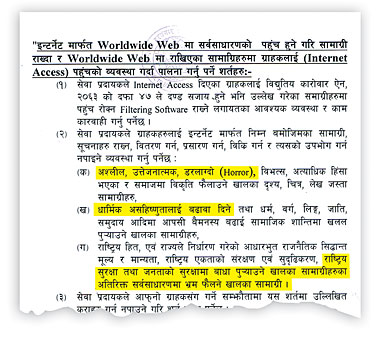 HORROR: NTA sent a letter this week to ISPs, warning of stiff punishment if they didn't fulfill conditions for operation that include filtering pornographic and 'horror' content. |
The cabinet's new Central Bureau of Investigation (CBI), set up last month, has already come under fire for being overzealous, and violating constitutionally guaranteed privacy laws in going after Internet Service Providers (ISPs).
The new 'FBI-style' unit was set up by the government two weeks ago in response to a nationwide rise in abductions, financial scams, cyber-crime and call-bypass syndicates. The high-powered and well-resourced force works under the direct control of the chief of police and is designed to act immediately to counter organised crime.
However, by targeting Nepal's ISPs, the CBI has stirred a hornet's nest among IT companies, constitutional lawyers and consumer advocacy groups, who say the unit is overstepping its bounds.
Sirish Karmacharya of the internet provider Namche was arrested this week and jailed for having provided bandwidth to customers who were allegedly using it to bypass calls. Nepal Telecommunication Authority (NTA) sent a letter this week to ISPs, warning of stiff punishment if they didn't fulfill conditions for operation that include filtering pornographic and 'horror' content. NTA wants material that 'incites racial and religious hatred' and is against the 'national interest' filtered.
"The conditions are too broad and ISPs can't be held responsible for what the subscribers use the internet for, it's their private business," explains Binay Bohara of the ISP Association. "In any case, filtering content is very expensive, cumbersome and difficult."
Constitutional lawyer Satish Kharel goes a step further and says NTA's conditions for use also violate the constitutionally guaranteed right to privacy. "Only parliament can pass laws restricting fundamental freedoms, it can't be done by NTA or the police," Kharel says. "This is an infringement of the constitution and also goes against the right to privacy under international human rights instruments to which Nepal is a signatory."
Kharel, who specialises in telecommunications, says if the government is serious about going after those misusing Voice over Internet Protocol (VOIP), it should investigate the real culprits and not those who are simply selling the connection.
 KIRAN PANDAY |
Minister of Information and Communication, Shankar Pokharel, said the government was losing billions in international call-bypass and was forced to act against operators with VOIP. "The state needs information on who is using excessive bandwidth at all times of the day, without this data it is difficult to catch the culprits," Pokharel told Nepali Times. "All we are asking is for the ISPs to pass on this information."
The police say they have been handicapped by their inability to access mobile phone and internet usage data in going after criminals. DIG Arjun Singh Bhandari says, "Our main concern is to ban VOIP calls as it becomes difficult to trace criminal activities, and organised crimes have been carried out using VOIP. We have requested ISPs to help us in our investigation."
But Karmacharya's arrest and the fact that he has been presumed guilty until proven innocent has sent shockwaves through the ISP community, and lawyers are aghast at the lack of due process in the case. This has led to suspicion that the police are themselves involved in extorting ISPs. "It now seems to be our turn to be milked," said one cyber caf� owner in Thamel.
Kunda Dixit
Internet shutdown?
Internet Service Providers (ISPs), who met the home and information ministers Thursday morning, said both blamed them for complicity in the call-bypass scam. ISPs say they can't run a business with the threat of arrest at any time and may collectively return their licenses. This would potentially paralyse internet services in Nepal.
ISPs say the new law holds them liable if an illegal VOIP operator is using its bandwidth without the knowledge of the service provider. Said one ISP owner: "The police want us to tell them about excessive use, but what is excessive use? Who defines it? There are hundreds of legitimate individuals and businesses who use more than 1MB, do we report all of them?"
Nepal's 49 ISPs have already blocked scores of pornographic sites under instruction from the police in the past month, and they say they can block other sites as well. But they can't be filtering everything because it is impossible, especially since the definition of what is deemed 'anti-national' and 'inciting racial hatred' is so broad.
Says the ISP Association's Binay Bohara: "If they tell us what to block we will block, but we can't accept this blanket blame."
READ ALSO:
"I don't want any more Sarahs to die",
Hotel Echo's last minutes, DAMBAR KRISHNA SHRESTHA
Trafficking labour, JB PUN MAGAR and BABURAM BISWOKARMA


